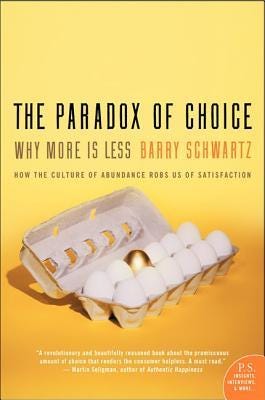The Paradox of Choice, by psychologist Barry Schwartz, is an influential book about how consumers make choices, and the tyranny of choice both Satisficers and Maximisers face in today’s cluttered markets.
Before Proceeding, one thing:
TelEmpathy also provides access to qualified mental health professionals
Click on the button below to know more.
The paradox referred to in the title is all about how (offering) more choice can sometimes mean fewer sales. Why? Because we are all suffering from ‘choice overload’; there are just too many products out there to scan through to either satisfy needs or maximize value.
According to Schwartz and extensive research, offering more choice creates a psychological burden that can turn consumers off, because more choice means more time and effort to choose and increased odds that you’ll make the wrong choice and regret it. Schwartz points to the famous ‘Jam Study’ that found that consumers were 10 times more likely to purchase jam from a range of 6 jams than they were from a range of 24. Less choice, more sales.
So offering more choice to consumers may not always be good – even though more choice should mean more and happier consumers, More choice should mean individual needs will be better satisfied, and more choice should mean an enhanced sense of autonomy (personal freedom), one of the three core drivers of human wellbeing (along with relatedness and competence). But more choice sometimes backfires – because it’s inconvenient and risky.
As a result, Schwartz argues that brands should not always seek to maximize choice for consumers by launching endless variants and line extensions. If a category is cluttered, leave it alone – unless you can be the best, and outspend competitors on distribution and advertising. Interestingly, in follow-up research to the book, psychologists have identified that adding more choice can be counter-productive
‘Low involvement’ products where people want to minimize effort
New categories, where people are unclear about their preferences
Complex products that make deciding difficult
Complex categories where options are difficult to compare
The Brand Genetics Take
As an innovation agency, we have a vested interest in the idea that more choice is (nearly) always better. By launching a new variant, flavor, size, pack, or branding, companies can better meet the diverse needs of the market. The Paradox of Choice is a useful challenge to this idea – sometimes launching another new product or line extension will not be commercially astute, particularly in cluttered categories. Product innovation is not always the answer to an innovation brief – service innovation, channel innovation, profit model innovation may work better.
An interesting implication of the Paradox of Choice is that innovators should focus on making choosing easier for consumers. He who makes the choice easiest wins. One way to do this would be for brands to become category curators, showcasing with a limited range of the best available, and helping consumers compare. Another way would be for innovators to bundle features into a ‘does-it-all’ product – one product that does it all including rendering an exhausting exhaustive search redundant.
Instead of ‘how can we better meet needs?’, the lesson from the Paradox of Choice is that innovators should be asking ‘how can we make it easier for people to choose?’
THE MAXIMISATION SCALE
Whether you are a Maximiser or Satisficer can depend on the product category, but Schwartz believes, we have a natural tendency to one of the other. The statements below distinguish maximizers from satisficers. Subjects rate themselves from 1 to 7, from “completely disagree” to “completely agree,” on each statement. We generally consider people whose average rating is higher than 4 to be maximizers. When Schwartz looked at averages from thousands of subjects, he found that about a third scored higher than 4.75 and a third lower than 3.25. Roughly 10 percent of subjects were extreme maximizers (averaging greater than 5.5), and 10 percent were extreme satisficers (averaging lower than 2.5.)
Whenever I’m faced with a choice, I try to imagine what all the other possibilities are, even ones that aren’t present at the moment.
No matter how satisfied I am with my job, it’s only right for me to be on the lookout for better opportunities.
When I am in the car listening to the radio, I often check other stations to see if something better is playing, even if I am relatively satisfied with what I’m listening to.
When I watch TV, I channel surf, often scanning through the available options even while attempting to watch one program.
I treat relationships like clothing: I expect to try a lot on them before finding the perfect fit.
I often find it difficult to shop for a gift for a friend.
Renting videos is really difficult. I’m always struggling to pick the best one.
When shopping, I have a hard time finding clothing that I really love.
I’m a big fan of lists that attempt to rank things
(the best movies, the best singers, the best athletes, the best novels, etc.).I find that writing is very difficult, even if it’s just writing a letter to a friend because it’s so hard to word things just right. I often do several drafts of even simple things.
No matter what I do, I have the highest standards for myself.
I never settle for second best.
I often fantasize about living in ways that are quite different from my actual life.
Share this article on WhatsApp & LinkedIn
Liked the content? Give us a Like ❤️️ & Comment your views
Have a great week ahead😄



